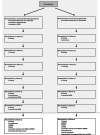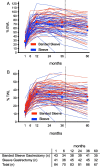Banded Versus Non-banded Sleeve Gastrectomy: 5-Year Results of a 3-Year Randomized Controlled Trial
- PMID: 38109013
- PMCID: PMC10810940
- DOI: 10.1007/s11695-023-06982-9
Banded Versus Non-banded Sleeve Gastrectomy: 5-Year Results of a 3-Year Randomized Controlled Trial
Abstract
Purpose: Banded sleeve gastrectomy (BSG) has been shown to enable better weight loss than non-banded sleeve gastrectomy (SG) in retrospective analyses. These findings were supported by two randomized controlled trials (RCT). However, to date, mid-term prospective data is not available.
Materials and methods: We invited all 94 patients of an RCT comparing banded to non-banded sleeve gastrectomy at 3 years (DRKS00007729) for a 5-year follow-up visit. Eighty-two patients (BSG n = 42; SG n = 40) came for evaluation. Outcome measures were identical with the RCT to allow longitudinal comparison. Data analysis was descriptive and focused on biometric data, development of comorbidities, mid-term complications, quality of life, and type of body contouring surgery (BCS).
Results: The per-protocol analysis revealed a treatment difference of 9% (CI - 1.5 to 19.6) excess weight loss (EWL). Total weight loss (TWL) was 27.4% (CI 23.5-31.3) after SG and 31.6% (CI 27.3-35.5) after BSG. Twenty percent of patients after SG and 11.9% following BSG had been converted to a gastric bypass. Type 2 diabetes went into remission in most patients (SG 66.7% vs. BSG 63.6%). Antihypertensive medication was stopped or reduced in 81.3% after SG and 80% after BSG. Reflux symptoms were similar in both groups (symptoms [Formula: see text] 1/ week: SG 28.2% vs. BSG 26.8%). Frequency of postprandial regurgitation was higher after BSG (SG 23% vs. BSG 59%). Forty percent of patients had undergone BCS at time of follow-up.
Conclusion: Five-year weight loss after BSG was 9% EWL and 4.2% TWL higher compared to SG. The main added morbidity following BSG was postprandial regurgitation.
Keywords: Banded sleeve gastrectomy; Bariatric surgery; Sleeve gastrectomy; Weight loss.
© 2023. The Author(s).
Conflict of interest statement
Jodok Fink, Gabriel Seifert, and Goran Marjanovic have received speaking honoraria from Medtronic GmbH, Meerbusch, and KLS Martin Group, Tuttlingen. All other authors declare no competing interests.
Figures


Similar articles
-
Banded Versus Nonbanded Sleeve Gastrectomy: A Randomized Controlled Trial With 3 Years of Follow-up.Ann Surg. 2020 Nov;272(5):690-695. doi: 10.1097/SLA.0000000000004174. Ann Surg. 2020. PMID: 32657920 Clinical Trial.
-
Comparison of the mid-term outcomes of banded and non-banded sleeve gastrectomy: safety, food tolerance, and weight regain.Surg Endosc. 2022 Dec;36(12):9146-9155. doi: 10.1007/s00464-022-09395-4. Epub 2022 Jun 28. Surg Endosc. 2022. PMID: 35764843 Free PMC article.
-
Comparison of Outcomes Between Banded and Non-banded Sleeve Gastrectomy: a Systematic Review and Meta-analysis.Obes Surg. 2022 Jul;32(7):1-12. doi: 10.1007/s11695-022-06043-7. Epub 2022 Apr 22. Obes Surg. 2022. PMID: 35451804
-
Banded versus nonbanded laparoscopic sleeve gastrectomy: 5-year outcomes.Surg Obes Relat Dis. 2019 Sep;15(9):1431-1438. doi: 10.1016/j.soard.2019.04.023. Epub 2019 May 2. Surg Obes Relat Dis. 2019. PMID: 31548001
-
Banded versus non-banded sleeve gastrectomy in obese patients: A systematic review & meta-analysis.Am J Surg. 2022 Oct;224(4):1156-1161. doi: 10.1016/j.amjsurg.2022.05.015. Epub 2022 May 20. Am J Surg. 2022. PMID: 35623944
Cited by
-
Banded Versus Non-banded Sleeve Gastrectomy: A Systematic Review and Meta-Analysis.Cureus. 2024 Jan 23;16(1):e52799. doi: 10.7759/cureus.52799. eCollection 2024 Jan. Cureus. 2024. PMID: 38389592 Free PMC article. Review.
References
MeSH terms
LinkOut - more resources
Full Text Sources
Medical
Miscellaneous

